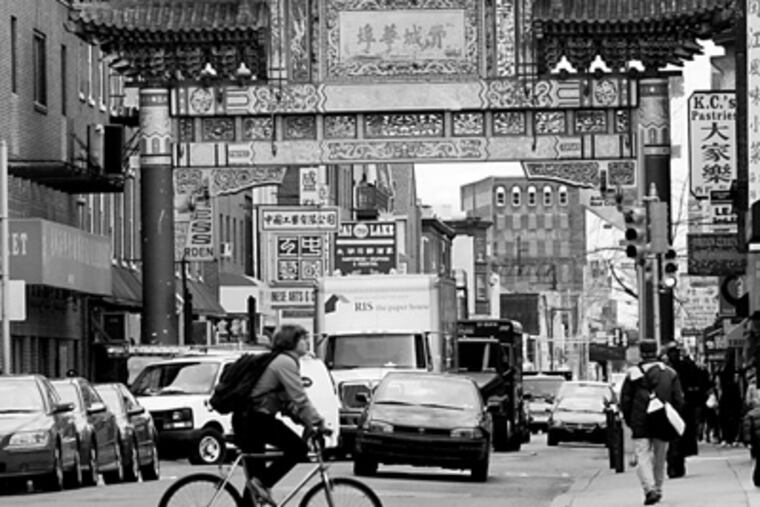Is Chinatown facing another existential threat?
Few Philadelphia neighborhoods have been forced to fend off existential threats as frequently as Chinatown. In the 1980s, the construction of the Vine Street Expressway literally divided the community in half. A few years later, a federal prison was built on Chinatown's eastern edge. In 2000, Chinatown residents fought off Mayor Street's proposed downtown Phill

Few Philadelphia neighborhoods have been forced to fend off existential threats as frequently as Chinatown.
In the 1980s, the construction of the Vine Street Expressway literally divided the community in half. A few years later, a federal prison was built on Chinatown's eastern edge. In 2000, Chinatown residents fought off Mayor Street's proposed downtown Phillies ballpark, and then they banded together again in 2009 when the city and state wanted to put a casino in Market East on Chinatown's southern border.
Those threats probably pale, though, compared with a complicated combination of growing pressures that are taking the China out of Chinatowns in cities across the nation, as reported this month by Bonnie Tsui in The Atlantic.
New York's Chinatown is losing population, San Francisco's Chinese population has grown old and gray, and smaller Chinatowns - like the one in Washington, D.C. - have almost disappeared.
That hasn't happened in Philadelphia. Indeed, few corners of the city are more crowded and alive than those in Chinatown. Overall, the community's population grew about 60 percent between 2000 and 2010, according to the U.S. Census Bureau, an increase that is yet another testament to the incredible resilience of this Philadelphia neighborhood.
But any dense, urban ethnic enclave has a certain fragility; immigration patterns can change pretty quickly, after all, and second-generation families typically move to other sections of the city or to the suburbs, where homes are larger.
Like most Chinatowns, Philadelphia's is the commercial heart of the city's increasingly diffuse Chinese community. But it is also the default residential choice for new working-class Chinese immigrants. Which makes Chinatown particularly vulnerable when immigration slows, as it has in recent years, according to John Chin, executive director of the Chinatown Commercial Development Corp.
A growing number of would-be immigrants, it seems, are concluding that better economic opportunities exist in booming China than in the stagnating United States.
Studies have already clearly established that foreign-born students, from China and elsewhere, are earning degrees at American universities and then leaving the United States in droves. For elites, the opportunities are often just as good or better back home.
But the long U.S. economic nightmare is leading even some low-income Chinese immigrants to wonder if they too might not be better off in China.
"Sometimes, when you talk to new immigrants, they have a sense of disappointment. They believed there'd be better economic opportunities, and they get here and everything is so quiet compared to China," said Melody Wong, a former Chinatown CDC staffer.
At the same time that opportunities are expanding in China and contracting in the United States, rents and home prices are increasing sharply in traditional Chinatowns, including Philadelphia's, making the enclaves still less appealing to low-income immigrants.
That gentrification is probably inevitable, given Chinatown's proximity to other high-rent Center City neighborhoods. And Chin says the neighborhood - whose residents are still largely low-income - could benefit from a few more middle- and upper-income residents.
But with rising rents and slowing immigration, there is the risk that Chinatown will become less Chinese in the years to come, particularly as a residential neighborhood. And as Washington's experience shows, when Chinese residents move out, Chinese businesses usually follow them, if a few years later.
"These are communities that are, at core, centers of commerce, and so it comes down to whether or not Chinese entrepreneurs think they can open a small business there and succeed," Chin said. "If Chinatowns aren't growing, they're shrinking."
None of this change is remotely inevitable. The U.S. economy has to pick up eventually (right?), and perhaps China's will slow some day as well. And there is plenty Chinatown can do on its own to counteract the macroeconomic forces outside of its control (witness October's Night Market, a street food spectacular that drew about 10,000 people).
Given Chinatown's record, I wouldn't bet against it.